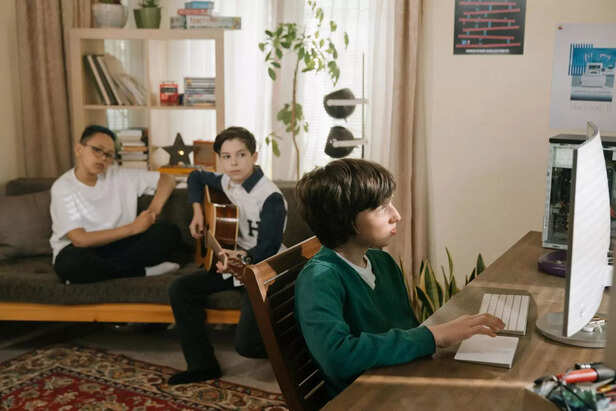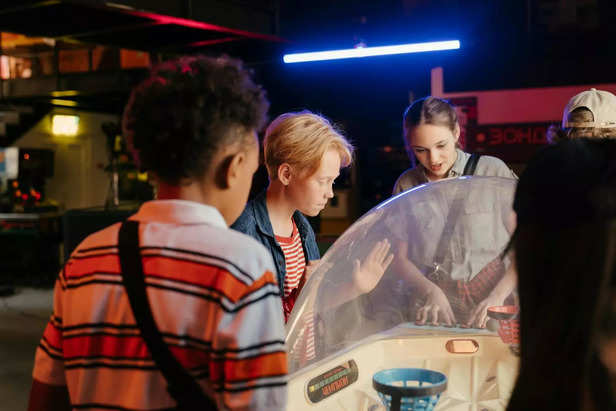Is Your Child Ready for Adolescence? Teach These 7 Essential Lesson!
Ankita Rai | Thu, 03 Apr 2025
Adolescence is a pivotal stage in a child's life, bringing rapid changes and new challenges. Before they step into this phase, they need essential life skills like responsibility, emotional intelligence, digital safety, and decision-making. This article highlights seven crucial lessons every child should learn to navigate adolescence confidently, fostering independence, kindness, and resilience. Equip your child with these vital skills for a smooth transition into their teenage years.

( Image credit : Pexels )
Photo:
Raising a child is like a trial run for a big expedition—the grueling trek to adulthood. It’s a period of fluctuation, a period of finding oneself, a period of facing new challenges. But before they make that leap into this consequential season, they’ve got to have some life skills and values to build upon. The lessons learnt will prepare them well for the teenage years, where they are embarking on a journey of exploring responsibility and emotional intelligence. Here are seven of the most important things for your kids to learn before they hit adolescence:

Life doesn’t come with a manual, but responsibility is the chapter in every success story. Teach your child that actions (both good and bad) have consequences. So, start small: Give them meaningful responsibilities — taking care of their homework, caring for a pet, making their bed. These foundational lessons of accountability will develop them into reliable and independent people.
Teenage years in many cases feel like a turbulent ride of patchy emotions. Help your child understand and manage their emotions. Show them how to say what they feel without exploding: talking, journaling, mindfulness work, whatever works. Emotional intelligence is not only about controlling anger; it is about recognizing emotions, practicing empathy, and developing resilience in difficult situations.

Good communication involves more than talking — it’s listening, comprehension and responding respectfully. Teach your kid to have important conversations, role-play challenging conversations, and practice active listening with your kid to help them build social skills. Whether they’re working through conflict, making new friends or sharing their needs, solid communication skills will last them a lifetime.
In a world that is becoming increasingly driven by technology, children need to know how to navigate the digital world safely. And by the time they are in preadolescence, they should know about the risks of oversharing, cyberbullying and online scams. Establish screen time limits and educate them about responsible use of the internet — because one post can have long-term consequences. The internet is incredibly powerful—but learning to use it wisely is something they'll have to learn to do early.

More kindness is needed in this world, and this starts at home. Teach your child to be kind, whether that is assisting a friend, offering thanks, or defending someone in distress. Empathy isn’t about being a doormat — it’s about having insight into how others feel, then acting accordingly with gentleness. These small pearls of humanity will make them a better friend, sibling and, one day, leader.”
Peer pressure can be a powerful thing, but the ability to be confident and self-aware can enable your child to stand their ground. But teach them it’s OK to say no, and to trust their instincts.” Role-play various scenarios so they feel equipped to deal with pressure in social situations. The skill of making good decisions — even when it’s not the popular choice — will serve them well for life.

Puberty brings changes, and kids should not only feel comfortable but also be prepared for them. Discuss daily hygiene routines with them — including taking showers regularly, dental hygiene and wearing clean clothes — not as a mandate, but as a mark of self-respect. And self-care isn’t just hygiene; it’s also about moderation in eating, movement and seeking sufficient sleep. When kids self-care, they experience confidence and self-worth.
Final Thoughts

Getting your child ready for adolescence isn’t simply about equipping them with life skills – it’s about teaching them to approach the future confidently and in good faith. By imparting these seven essential lessons, you’re equipping them to face life’s challenges with wisdom and fortitude. So have these conversations early, model the behavior, and watch them transform into proud, capable and good-hearted people.
Unlock insightful tips and inspiration on personal growth, productivity, and well-being. Stay motivated and updated with the latest at My Life XP.
Responsibility and Accountability

kids with their parent
( Image credit : Pexels )
Life doesn’t come with a manual, but responsibility is the chapter in every success story. Teach your child that actions (both good and bad) have consequences. So, start small: Give them meaningful responsibilities — taking care of their homework, caring for a pet, making their bed. These foundational lessons of accountability will develop them into reliable and independent people.
Self-Regulation and managing emotions
Teenage years in many cases feel like a turbulent ride of patchy emotions. Help your child understand and manage their emotions. Show them how to say what they feel without exploding: talking, journaling, mindfulness work, whatever works. Emotional intelligence is not only about controlling anger; it is about recognizing emotions, practicing empathy, and developing resilience in difficult situations.
Well Developed Communication and Social Skills

social life
( Image credit : Pexels )
Good communication involves more than talking — it’s listening, comprehension and responding respectfully. Teach your kid to have important conversations, role-play challenging conversations, and practice active listening with your kid to help them build social skills. Whether they’re working through conflict, making new friends or sharing their needs, solid communication skills will last them a lifetime.
Digital Safety and Internet Responsibility
In a world that is becoming increasingly driven by technology, children need to know how to navigate the digital world safely. And by the time they are in preadolescence, they should know about the risks of oversharing, cyberbullying and online scams. Establish screen time limits and educate them about responsible use of the internet — because one post can have long-term consequences. The internet is incredibly powerful—but learning to use it wisely is something they'll have to learn to do early.
Kindness and Empathy Are Incorruptible Assets

to be kind
( Image credit : Pexels )
More kindness is needed in this world, and this starts at home. Teach your child to be kind, whether that is assisting a friend, offering thanks, or defending someone in distress. Empathy isn’t about being a doormat — it’s about having insight into how others feel, then acting accordingly with gentleness. These small pearls of humanity will make them a better friend, sibling and, one day, leader.”
How to Manage Peer Pressure and Make Healthy Choices
Peer pressure can be a powerful thing, but the ability to be confident and self-aware can enable your child to stand their ground. But teach them it’s OK to say no, and to trust their instincts.” Role-play various scenarios so they feel equipped to deal with pressure in social situations. The skill of making good decisions — even when it’s not the popular choice — will serve them well for life.
Self-Care and Personal Hygiene

less use of digital tools
( Image credit : Pexels )
Puberty brings changes, and kids should not only feel comfortable but also be prepared for them. Discuss daily hygiene routines with them — including taking showers regularly, dental hygiene and wearing clean clothes — not as a mandate, but as a mark of self-respect. And self-care isn’t just hygiene; it’s also about moderation in eating, movement and seeking sufficient sleep. When kids self-care, they experience confidence and self-worth.
Final Thoughts

kid
( Image credit : Pexels )
Getting your child ready for adolescence isn’t simply about equipping them with life skills – it’s about teaching them to approach the future confidently and in good faith. By imparting these seven essential lessons, you’re equipping them to face life’s challenges with wisdom and fortitude. So have these conversations early, model the behavior, and watch them transform into proud, capable and good-hearted people.
Unlock insightful tips and inspiration on personal growth, productivity, and well-being. Stay motivated and updated with the latest at My Life XP.






